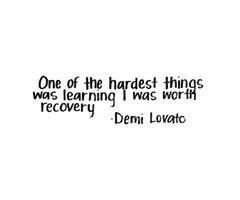My name is Sara and I am a (proud!) recovering alcoholic. My sobriety date is February 11th, 2017. As of today, I am 62 days sober! In this blog, I will share my experience, strength, and hope with other recovering alcoholics, those still struggling with alcoholism/addiction, and those who are interested to learn more about the disease!
I was born on July 5th, 1993. Three days later, I was adopted by two physicians who I call my parents. I grew up as the only child, my parents’ prized possession. If I had to describe my childhood in one word, it would be happiness. Although sometimes sheltered, I had everything a well-brought-up girl should have. My mom always said that I was the happiest (although incredibly stubborn!) child she had ever seen. I know what some of you are thinking: “how could this girl with the picture-perfect childhood end up being an alcoholic? It does’t make sense!”
As grade school approached, I often wondered about my biological parents. I was always told growing up that I was adopted, but since my adoption was closed, I could never get any information about them. The curiosity and a feeling of “who am I? was growing stronger as I grew older. I was diagnosed with ADHD when I was in the 6th grade, and I hated the feeling of being austrosized or heaven forbid I had a disorder.
Around the same time I was diagnosed with ADHD, my beloved grandmother was diagnosed with an inoperable form of lung cancer. I had a relationship with my grandmother that I will never forget. Sometimes I would fake sick just so that I could spend time with her and watch Titanic for the thousandth time. She lived right across the street from my elementary school, so I went over to her house almost every day after school while my parents were at work. We had a very close bond, and everyone noticed. When she was diagnosed and given 6 months to a year to live, I supressed every negative emotion regarding her illness. When my grandmother was really having a hard time emotionally and physically (because of the chemo), she moved in with my parents and I. At the ripe age of 12, I literally watched my best friend suffer before my eyes. Her cancer spread to her brain, which caused her to have a massive stroke that paralyzed the left side of her body. My grandma eventually went into hospice care, and suffocated to death.
When that dreaded phone call came from my mom at 3:02 a.m. Informing me and my dad that grandma had passed, I immediately felt numb. Absolutely no emotion whatsoever. I knew this day was coming. Instead of sobbing hysterically or having normal emotions of sadness and grief, I continued to suppress these feelings. I refused to go near her casket at her showing, and I did not shed a tear at her funeral. When everyone was going through the “normal” stages of grief, I coped in the only way I knew how. My mom tried to approach me about my coping mechanisms and tried to put me in therapy to try and process my emotions, but I refused and always said that I was fine.
I graduated from 8th grade and went from a class of 12 students to a brand new high school with over 250 kids in the freshman class. AKA, I went boy crazy and rebelled like you wouldn’t believe. I would not do my homework for two weeks straight, I was on behavioral probation, and I even ripped a chemistry test in front of a teacher just for the hell of it. The only activity that made me happy in high school was theater. In the words of my drama teacher, “Pandora’s box was opened”. I was the lead in multiple school musicals/plays and thought I was on top of the world. My grandma frequently crossed my mind, but I forced myself to forget about it. Around this time, I also tried to find my biological parents, but my mom (who was incredible for helping and supporting me!) and I always came to a dead end. I had a lot of hidden emotions about my adoption too, but (surprise) I didn’t want to deal with those feelings either.
As I continued to be a complete asshole throughout my high school career, the end was finally near. Around the second half of my senior year I started experimenting with alcohol. I remember the first time I got intoxicated, I remember how great it felt, and that I could pound beers like water and drink all of my friends under the table. Of course I woke up with a hangover, but as soon as that hangover went away I was always looking forward to when I could get my hands on that next drink. I craved it. I was built to drink and I was proud of it.
About two months before I graduated high school, I met a guy that would significantly influence my life in so many ways. The good, the bad, and the very very ugly. We started dating two weeks later, and things got very intense very quickly. The amount of chemistry we had was out of this world. I had never met a guy quite like him. I had never met a guy that treated me so great. I was in love and nothing else mattered. In the first couple of months that we dated, we didn’t drink and I didn’t crave it. Around 4 months into our relationship, we drank together for the first time. There it was again! That feeling of happiness that alcohol gave me, and that feeling of “nothing else matters.” I missed it. As our relationship intensified, I put a lot of other important life responsibilities on the backburner. I flunked out of my first semester of community college, and I gained 40 lbs in less than 4 months. We started drinking together every weekend, and the weekdays couldn’t go by fast enough until I could get my lips on an alcoholic beverage. I noticed myself starting to get angry if we couldn’t find someone to buy alcohol for us. My weekend was ruined if we didn’t drink.
Two years into my ex’s and I’s relationship, I found text messages on his phone that were questionable. He had been on free dating websites, and sending flirtatious pictures to girls across the country. I was basically living with him and his grandfather at the time, so I woke him up, showed him the texts, yelled at him, packed up my shit and left. Of course I got text messages, and numerous phone calls from him expressing his guilt and that he would never do it again. I loved him so much, and I always believed that people could change, so I took him back less than 72 hours after I found those messages.
The relationship was never the same after that. I continued to drink, and by this time I was 21, got my shit together when it came to school, and I was on my way to graduate with my bachelors degree in social work with a 3.95 grade point average. Of course the legal drinking age in the U.S. is 21, so I bought alcohol on a regular basis, and would often hide the bottles/cans because I knew what I was doing wasn’t normal. My ex and my parents would find the bottles but I swore up and down the table that I did NOT HAVE A PROBLEM. I found myself drinking to intoxication at least once during the week, and Friday and Saturday of every weekend.
Around this time, right before I was about to graduate, the law that closed adoptions could apply to get their original birth certificate became legal. Of course I jumped on this opportunity. I received my original birth certificate about a month later. When I found my biological mother’s name on that birth certificate I jumped right on Facebook and found here. There she was! I started crying as soon as I saw her picture on that computer screen. Instead of suppressing my emotions like I had done throughout most of my life, I let the tears of happiness flow like a river. I let those emotions in because it was a happy emotion, not a negative emotion. I contacted her and met her two weeks later, and it was one of the best days of my life. We still have regular contact today. 🙂
Shortly after, my boyfriend and I moved into our first apartment together. I graduated with my Bachelor’s degree in social work, and I was about to start graduate school (to get my MSW) in the summer. I thought that moving in together was going to “fix” everything, and all of our hopes and dreams that we talked about together would come true. We lived together for about 8 months, and my drinking started to escalate and he started to notice. He started saying things like “we don’t have to drink every day, Sara.” That scared me. But of course, I ignored his comments and the emotions that came along with it. I quickly noticed that living together full time was a lot different than basically living part-time together. We started arguing about my alcohol use, about how I didn’t tidy things up around the apartment like I should have, and numerous other arguments that I don’t want to delve into.
One day, I came home from my graduate-school internship and I wanted to surprise him for lunch. We had gotten into a pretty intense argument the night before and I wanted to “clear the air” so to speak. Instead of making up, we broke up. My ex basically said that our relationship “wasn’t the same anymore.” I did the same thing that I did when he cheated on me for the first time– I packed up my shit and left. But this time I didn’t go back. I was done.
Despite the breakup, I managed to graduate with my Master’s degree in social work with a sky-high grade point average. I hung out with girlfriends that I had put to the side when I was with my ex, I went skydiving, I did a mini-marathon, and I got my first big girl job. Everyone around me (except my parents) thought that I was embracing my independence. Little did everybody around me know that I was suffering an incredible amount. I was completely heartbroken. Behind closed doors, the bottle was my way of coping. I would lock myself in my room and drink. At first the alcohol gave me a euphoria so to speak. I had all this confidence that I could move on from him, and that life was great. As the night progressed and drank more, this confidence became depression and I would end up in tears. This became and every day/night occurrence and it was starting to effect every aspect of my life in a negative manner. I continued to gain weight, my health was starting to deteriorate, I was putting myself in situations that I would NEVER get into if I was sober… I was basically going through the motions of everyday life, but not really feeling what was going on around me. My parents were so worried about me because the alcohol bottles that they found around the house were astronomical. But of course, I STILL DIDN’T HAVE A PROBLEM, DAMNIT.
Eventually, (eventually meaning 8 months later) I hit rock bottom. I don’t want to delve into the nitty gritty details just yet of what my rock bottom was, but what I will say was that it was a wake up call that I needed to get my life together. Alcohol was ruining my life. My grandfather (who has over 30 years of sobriety), and my mom and I went to an Alcoholics Anonymous meeting a couple days after my night of rock-bottom deubochery. I was slowly admitting that I had a problem, but I was so embarrassed to walk into my first meeting. I walked into that room lookin’ a HOT mess. Hair in disarray, eyes puffy from crying, hood up, arms and legs crossed, and avoiding all possible eye contact. But, my plan to hide in the back row and pretending that I didn’t exist did not work out in my favor. Every single person in that room came up to me, shook my hand, and welcomed me to the meeting. My stone cold expression on my face slowly softened. I was confused as I looked around the people in the room. They all seemed so happy. I thought “how in the hell can all of these alcoholics be happy? I am absolutely miserable!” The first meeting that I went to was an open discussion, and the moderator picked the topic “what it felt like to be a newcomer to Alcoholics Anonymous.” I was overcome with emotion from the stories that the group members shared. But, when the meeting was over, I felt a sense of hope. I wanted to get sober and stay sober. I admitted that my alcohol use was making my life unmanageable.
At the next meeting I went to, I admitted to myself and the group that I was an alcoholic. I can’t even begin to describe to you how GREAT that felt. I was free of the secret that I had been hiding for years, and I was surrounded by a group of amazing people who were just like me. As I went to more and more meetings, I became happier and happier. I FINALLY let myself deal with negative emotions, learned better coping mechanisms when these negative emotions come, and that it is okay to FEEL emotions that are uncomfortable. And, I am never ever alone when I am processing these emotions, and I am certainly never alone in my journey in sobriety. Last but not least, I finally let go of the anger, hurt, and sadness that was left after my breakup with my ex. That was probably the most freeing emotion of all.
My life has changed for the better in more ways that than I can count in these 62 days of sobriety. Alcoholics Anonymous has saved my life! I am the happiest that I have ever been. I no longer have to lean on alcohol to get through the day, I no longer have to stuff my face with obscene amounts of food, and I am no longer embarrassed that I’m an alcoholic. I will fully admit that I am an alcoholic and I’m damn proud of it, and I am proud of my sobriety. I am working through the 12 steps, going to meetings 6 days a week, have a home group and sponsor, and I am continuing to repair relationships that I have broken in the past. I am establishing a relationship with my Higher Power that I never thought was possible. The list could go on and on, but that’s what this blog is for, right?!
Some people say that “its not about the journey, its about the destination.” My story can relate to this saying, that’s for sure. My journey has led me to my destination of sober living, which has been an incredible blessing. I will end with this quote: “I have survived because the fire inside me burned brighter than the fire around me.”
One day at a time, my friends. One day at a time.

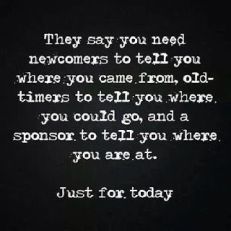 e that she “couldn’t imagine getting sober at my age.” Yes, I’ve heard it time and time again, and I have touched on it in previous blog posts. I’m young. I’m 23 (I’ll be 24 July 5th!) and I have decided to live a sober lifestyle. Everyone around me – including those inside of the rooms of AA and out- has expressed how “hard” it must be for me (it’s hard for everyone, isn’t it?). I don’t think age has anything to do with choosing to be sober- I consider myself one of the lucky ones. I am choosing to not go through years of misery, and it frightens me to think about the person I may have become if I continued to drink the way that I did.
e that she “couldn’t imagine getting sober at my age.” Yes, I’ve heard it time and time again, and I have touched on it in previous blog posts. I’m young. I’m 23 (I’ll be 24 July 5th!) and I have decided to live a sober lifestyle. Everyone around me – including those inside of the rooms of AA and out- has expressed how “hard” it must be for me (it’s hard for everyone, isn’t it?). I don’t think age has anything to do with choosing to be sober- I consider myself one of the lucky ones. I am choosing to not go through years of misery, and it frightens me to think about the person I may have become if I continued to drink the way that I did. lism. It means that I have to make amends to the people that I’ve hurt, write out my character defects, and give my life to the care of my Higher Power as I understand Him. It means that I’m willing to pick up the phone to talk to another alcoholic when I’m having the urge to drink (easier said than done! Trust me). I’m dedicated to growing in the fellowship of AA, helping another alcoholic, and to become the best version of myself. I’m dedicated to being (and working) an honest program, even when I’m doing something wrong. I’m dedicated to staying sober for another 24 hours.
lism. It means that I have to make amends to the people that I’ve hurt, write out my character defects, and give my life to the care of my Higher Power as I understand Him. It means that I’m willing to pick up the phone to talk to another alcoholic when I’m having the urge to drink (easier said than done! Trust me). I’m dedicated to growing in the fellowship of AA, helping another alcoholic, and to become the best version of myself. I’m dedicated to being (and working) an honest program, even when I’m doing something wrong. I’m dedicated to staying sober for another 24 hours. – sobriety is hard work!! Believe you me, sobriety is an every day battle. If sobriety was easy, everyone would do it. If sobriety was easy, relapses wouldn’t occur as often as they do. I have been through hell and back, and finally, for the first time in my life, I’m comfortable. I’m happy. I’m done with the absolute insanity that alcohol created. Alcohol created a person that was depressed, impulsive, and irresponsible. Alcohol made me feel like I was a prisoner. I am willing to put the work in so that I can be happy, joyous, and free. And that has made all the difference.
– sobriety is hard work!! Believe you me, sobriety is an every day battle. If sobriety was easy, everyone would do it. If sobriety was easy, relapses wouldn’t occur as often as they do. I have been through hell and back, and finally, for the first time in my life, I’m comfortable. I’m happy. I’m done with the absolute insanity that alcohol created. Alcohol created a person that was depressed, impulsive, and irresponsible. Alcohol made me feel like I was a prisoner. I am willing to put the work in so that I can be happy, joyous, and free. And that has made all the difference. atically going to the “what if’s” and the absolute worst, which does nothing but cause my anxiety to spiral out of control. But, the fear of the unknown is absolutely killing me. I am going to have to hear what I did that night, what charges I’m faced with, etc. I just know I’m going to lose it. I cry even thinking about it. I cry thinking about that night, the person I was, and how alcohol had such a powerful (And completely negative) effect on me. Looking back on the person I was while I was in the heat of my drinking almost has a post traumatic stress disorder effect on me.
atically going to the “what if’s” and the absolute worst, which does nothing but cause my anxiety to spiral out of control. But, the fear of the unknown is absolutely killing me. I am going to have to hear what I did that night, what charges I’m faced with, etc. I just know I’m going to lose it. I cry even thinking about it. I cry thinking about that night, the person I was, and how alcohol had such a powerful (And completely negative) effect on me. Looking back on the person I was while I was in the heat of my drinking almost has a post traumatic stress disorder effect on me. 
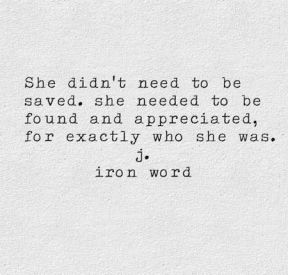 etter than others, but sobriety has opened my eyes to a completely new way of life- and this life is fantastic. And, I have a boyfriend! I KNOW, I KNOW. I know the “old timer” rule is to not date for the first year of sobriety; but this just kind of happened- and its the healthiest relationship I’ve ever been in. We all know how much time and energy that is needed in order to make a relationship successful, but for the first time in my life, it’s easy. And, we have similar goals and similar brains, if you catch my drift. My sobriety has let me heal from past relationship experiences and has allowed me to let (and trust!) new people in my life.
etter than others, but sobriety has opened my eyes to a completely new way of life- and this life is fantastic. And, I have a boyfriend! I KNOW, I KNOW. I know the “old timer” rule is to not date for the first year of sobriety; but this just kind of happened- and its the healthiest relationship I’ve ever been in. We all know how much time and energy that is needed in order to make a relationship successful, but for the first time in my life, it’s easy. And, we have similar goals and similar brains, if you catch my drift. My sobriety has let me heal from past relationship experiences and has allowed me to let (and trust!) new people in my life. reaming from it. My Grandpa expressed his how much he loved me, and how glad he was “to have his Sara back.” He then asked me what I was most scared about being sober. I was silent for a good 5 seconds because I never really thought about it. I confused as to why he was even asking me this! Why in the hell would I want to focus on something like that? I took another 5 seconds to think about it, and I replied “relapse.” What if I did relapse? The following scenario would probably happen. I would have one drink and be off to the races. Immediately, my brain chemicals would alter and I would become a different person. “One drink” leads to 6, and 6 leads to daily drinking. I would begin to isolate, I would begin to put alcohol before all other responsibilities, I would drop out of school and quit my job, I would hurt others around me, I would stop going to meetings and no longer participate in therapy, I would begin to lie and manipulate everyone around me… the list could go on and on. At that moment, my palms started to sweat. My heart started to race. My knee started to bounce up and down. The thought of relapse made me physically sick.
reaming from it. My Grandpa expressed his how much he loved me, and how glad he was “to have his Sara back.” He then asked me what I was most scared about being sober. I was silent for a good 5 seconds because I never really thought about it. I confused as to why he was even asking me this! Why in the hell would I want to focus on something like that? I took another 5 seconds to think about it, and I replied “relapse.” What if I did relapse? The following scenario would probably happen. I would have one drink and be off to the races. Immediately, my brain chemicals would alter and I would become a different person. “One drink” leads to 6, and 6 leads to daily drinking. I would begin to isolate, I would begin to put alcohol before all other responsibilities, I would drop out of school and quit my job, I would hurt others around me, I would stop going to meetings and no longer participate in therapy, I would begin to lie and manipulate everyone around me… the list could go on and on. At that moment, my palms started to sweat. My heart started to race. My knee started to bounce up and down. The thought of relapse made me physically sick. de all negative/scary emotions until crisis occurs (and then I keep digging, like every stubborn alcoholic!). And that’s just it- until crisis occurs. This unsuccessful way of coping has been a repeated pattern in my life ever since I can remember. The point of my wise old Grandpa asking me this question was to come up with a plan to avoid crisis. I was annoyed at the time, because I didn’t understand what he was trying to do. Now, I have a couple of “plan B’s” that will ensure success in situations where relapse is possible.
de all negative/scary emotions until crisis occurs (and then I keep digging, like every stubborn alcoholic!). And that’s just it- until crisis occurs. This unsuccessful way of coping has been a repeated pattern in my life ever since I can remember. The point of my wise old Grandpa asking me this question was to come up with a plan to avoid crisis. I was annoyed at the time, because I didn’t understand what he was trying to do. Now, I have a couple of “plan B’s” that will ensure success in situations where relapse is possible.
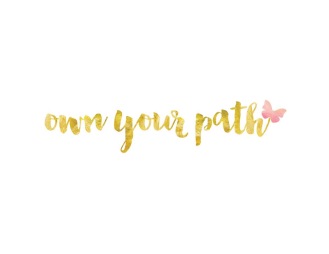
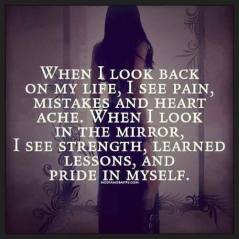 hypothyroidism since I was in the 4th grade. I have to take Synthroid every single morning so that I get a thyroid hormone in my system that my body is not making on its own. If I don’t take that medication, I will gain water weight, lose my hair, feel exhausted 24/7.. the list goes on and on. If I abstain from taking my Synthroid for a long period of time, I could develop thyroid cancer. Same analogy goes for alcohol. If I have “just one” drink, one drink becomes 6, and before you know it, my life is spiraling out of control. If I drank like I used to, I would slowly die- just like if I did not take my thyroid hormone.
hypothyroidism since I was in the 4th grade. I have to take Synthroid every single morning so that I get a thyroid hormone in my system that my body is not making on its own. If I don’t take that medication, I will gain water weight, lose my hair, feel exhausted 24/7.. the list goes on and on. If I abstain from taking my Synthroid for a long period of time, I could develop thyroid cancer. Same analogy goes for alcohol. If I have “just one” drink, one drink becomes 6, and before you know it, my life is spiraling out of control. If I drank like I used to, I would slowly die- just like if I did not take my thyroid hormone. an, you just don’t see many 23 year old’s who abstain from alcohol completely. More often than not, I am the youngest person in the room when I go to my AA meetings. But, when I have this “stinkin’ thinkin'”, my automatic reaction is to call my sponsor, spend time with my sober supports, read AA literature, or distract myself with doing something fun, or bless your eyes with a blog post ( You’re welcome! 😉 ). If anything, getting sober at a young age is literally a lifesaver.
an, you just don’t see many 23 year old’s who abstain from alcohol completely. More often than not, I am the youngest person in the room when I go to my AA meetings. But, when I have this “stinkin’ thinkin'”, my automatic reaction is to call my sponsor, spend time with my sober supports, read AA literature, or distract myself with doing something fun, or bless your eyes with a blog post ( You’re welcome! 😉 ). If anything, getting sober at a young age is literally a lifesaver.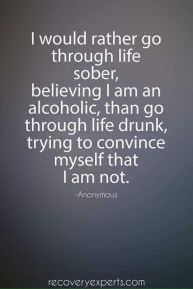
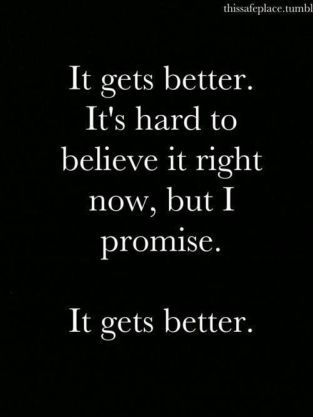
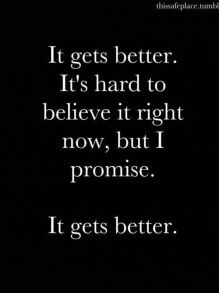
 with them on Thursday. They haven’t asked me to do something with them in years. Being around the alcohol was slightly annoying, but I let out the stress on the four-wheeler! And yes, I stayed sober and did not pick up a single drink!
with them on Thursday. They haven’t asked me to do something with them in years. Being around the alcohol was slightly annoying, but I let out the stress on the four-wheeler! And yes, I stayed sober and did not pick up a single drink! oxication, Alcohol Withdrawal, Other Alcohol-Induced Disorders, and Unspecified Alcohol-Related Disorder. According to the text, In the United States, the 12-month prevalence of Alcohol Use disorder is estimated to be 4.6% among 12-to 17-year-olds and 8.5% among adults ages 18 years and older in the United States. Rates of the disorder are greater among men (16.2%) than among adult women (4.9%). I’m going to focus on Alcohol Use Disorder- how it’s diagnosed, what the symptoms are, and how the severity of the disorder is determined.
oxication, Alcohol Withdrawal, Other Alcohol-Induced Disorders, and Unspecified Alcohol-Related Disorder. According to the text, In the United States, the 12-month prevalence of Alcohol Use disorder is estimated to be 4.6% among 12-to 17-year-olds and 8.5% among adults ages 18 years and older in the United States. Rates of the disorder are greater among men (16.2%) than among adult women (4.9%). I’m going to focus on Alcohol Use Disorder- how it’s diagnosed, what the symptoms are, and how the severity of the disorder is determined.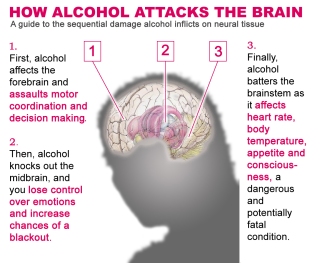 ysical disease. As alcoholism is an addiction, it is considered a disease of the brain. The brain has been physically altered by extended exposure to alcohol, causing it to function differently and therefore creating addictive behavior.
ysical disease. As alcoholism is an addiction, it is considered a disease of the brain. The brain has been physically altered by extended exposure to alcohol, causing it to function differently and therefore creating addictive behavior.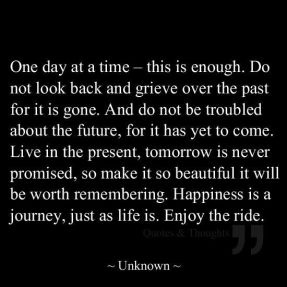
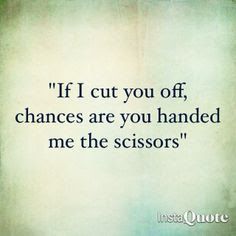 h. Never. All of them are still bar-hopping, and posting videos/pictures of their night out of heavy drinking. And that’s exactly it- they were my drinking buddies– and that’s it. On my sobriety date, I severely sprained my ankle and I had to wear a walking boot for 7 weeks. I couldn’t drive, I couldn’t do many of my normal day to day activities. Out of the 25 people that I thought were my friends, 3 of them were concerned about my well-being and even drove me to doctors appointments (bless their hearts!). When I started telling the rest of my “friends” that I am living a sober lifestyle, they magically disappeared. Shocking, ground-breaking information… right?!
h. Never. All of them are still bar-hopping, and posting videos/pictures of their night out of heavy drinking. And that’s exactly it- they were my drinking buddies– and that’s it. On my sobriety date, I severely sprained my ankle and I had to wear a walking boot for 7 weeks. I couldn’t drive, I couldn’t do many of my normal day to day activities. Out of the 25 people that I thought were my friends, 3 of them were concerned about my well-being and even drove me to doctors appointments (bless their hearts!). When I started telling the rest of my “friends” that I am living a sober lifestyle, they magically disappeared. Shocking, ground-breaking information… right?!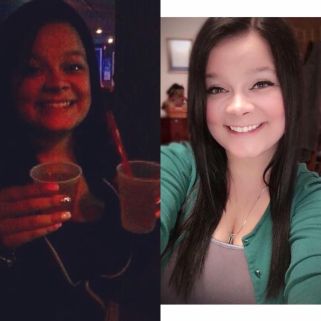 nd felt the warmth going down my throat… and I instantly felt better. I said to myself word for word in the mirror: “who the hell are you? what have you become?!” I sank to the floor and cried. I wanted to punch the mirror so I didn’t have to look at the girl who was destroying her life. In that exact moment I wanted to stop the insanity. But later that night, I was back at it again— and with the people who were enabling my alcoholism. The picture on the left is me in July of 2015, and the picture on the right is me in March of 2017. Fake happiness on the left, real happiness on the right.
nd felt the warmth going down my throat… and I instantly felt better. I said to myself word for word in the mirror: “who the hell are you? what have you become?!” I sank to the floor and cried. I wanted to punch the mirror so I didn’t have to look at the girl who was destroying her life. In that exact moment I wanted to stop the insanity. But later that night, I was back at it again— and with the people who were enabling my alcoholism. The picture on the left is me in July of 2015, and the picture on the right is me in March of 2017. Fake happiness on the left, real happiness on the right. unapologetically myself. I no longer feel the need to change who I am for somebody else’s approval. And that is one of the amazing blessings that sobriety has given me. My dad said to me today “you look so much different than you did on February 11th.” And that is 100% correct! Physically, I’ve lost 30 lbs. Emotionally, I am a happy, confident 23 year old girl. Even though I am still early in sobriety, I can see how much my life has changed for the better in so many ways. In the first couple days of sobriety, I was so sad that I would probably loose many of my “friends.” Now that I’m sober and have a clear head, I’m happy that I did a bit of “Spring Cleaning”, so to speak. It’s a great day to be sober. 🙂
unapologetically myself. I no longer feel the need to change who I am for somebody else’s approval. And that is one of the amazing blessings that sobriety has given me. My dad said to me today “you look so much different than you did on February 11th.” And that is 100% correct! Physically, I’ve lost 30 lbs. Emotionally, I am a happy, confident 23 year old girl. Even though I am still early in sobriety, I can see how much my life has changed for the better in so many ways. In the first couple days of sobriety, I was so sad that I would probably loose many of my “friends.” Now that I’m sober and have a clear head, I’m happy that I did a bit of “Spring Cleaning”, so to speak. It’s a great day to be sober. 🙂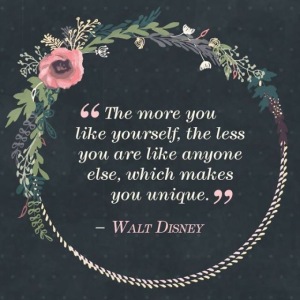 problems, but alcohol isn’t one of them.” My aunt called my mother and told her that “this is just a phase Sara is going through, she’ll get over it.” All of this is incredibly new to them. My thought process was “I’m already different as it is, this is just going to put it over othe edge!” Two of my cousins have had baby showers over the past couple of months that I did not attend. I didn’t feel comfortable being in an environment where alcohol was involved. This has also been upsetting my family- they think that I am deliberately ignoring them for reasons that are unclear.
problems, but alcohol isn’t one of them.” My aunt called my mother and told her that “this is just a phase Sara is going through, she’ll get over it.” All of this is incredibly new to them. My thought process was “I’m already different as it is, this is just going to put it over othe edge!” Two of my cousins have had baby showers over the past couple of months that I did not attend. I didn’t feel comfortable being in an environment where alcohol was involved. This has also been upsetting my family- they think that I am deliberately ignoring them for reasons that are unclear. alcoholics/addicts with sunshine and rainbows. Instead, society labels alcoholics/addicts as junkies, wine-o’s, meath heads, stoners… etc. These stigmas all infer (in my opinion) that substance abuse is a lifestyle choice, not a disease (I’m already planning on making a post about this topic- don’t you worry!). Many alcoholics keep their disease a secret in fear of losing their job, or fear of harsh judgement. Those are just two examples, but the list could go on and on. These fears are a result of the “skid row” alcoholic stereotype, so to speak. Breaking “anonymity” is often a personal decision to help another alcoholic, but often doesn’t come up in general conversation. Outside of a meeting, its not like I go up to someone at a social gathering and say with a huge smile on my face “Hi! I’m Sara, and I’m an alcoholic!” I have a very strong personality (shocking, right?!), and whenever I have a chance to advocate for vulnerable populations, I tend to do it- especially if I have a personal connection/experience with it. What can I say? It’s the social worker in me. 🙂
alcoholics/addicts with sunshine and rainbows. Instead, society labels alcoholics/addicts as junkies, wine-o’s, meath heads, stoners… etc. These stigmas all infer (in my opinion) that substance abuse is a lifestyle choice, not a disease (I’m already planning on making a post about this topic- don’t you worry!). Many alcoholics keep their disease a secret in fear of losing their job, or fear of harsh judgement. Those are just two examples, but the list could go on and on. These fears are a result of the “skid row” alcoholic stereotype, so to speak. Breaking “anonymity” is often a personal decision to help another alcoholic, but often doesn’t come up in general conversation. Outside of a meeting, its not like I go up to someone at a social gathering and say with a huge smile on my face “Hi! I’m Sara, and I’m an alcoholic!” I have a very strong personality (shocking, right?!), and whenever I have a chance to advocate for vulnerable populations, I tend to do it- especially if I have a personal connection/experience with it. What can I say? It’s the social worker in me. 🙂